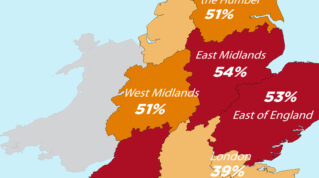Five education secretaries and one scrapped schools bill later, here’s what we could find out about what remains of the government’s ‘Opportunity for All’ white paper. John Dickens reports …
The two ‘ambitions’
Policy: By 2030, 90 per cent of primary pupils will meet the expected standard in reading, writing and maths, up from 65 per cent in 2019.
Progress: Ministers are even further away from when they started at key stage 2, with the percentage of children leaving primary at the expected standard falling to 59 per cent last year.
Policy: An “ambition” to increase the national GCSE average grade in English language and maths from 4.5 in 2019, to 5 by 2030.
Progress: The allowance of some grade inflation last year led to the average maths GCSE score rising from 4.53 in 2019 to 4.72, while the average English grade rose from 4.96 to 5.17.
A true comparison will not be possible until at least 2024, when grade inflation is expected to be eradicated.
A report last week by the National Audit Office told ministers to “further develop” their approach to monitoring progress as no milestones had been set.
The new policies
Chapter 1: An excellent teacher for every child
1. Consult on leadership NPQ for SENCOs
DELAYED: Tied up in the delayed SEND review.
2. Scholarships for language graduates
DELIVERED: 175 scholarships worth £27,000 are available. BUT this support was reinstated after it was axed a few years ago.
3. ITT course to get engineers teaching physics
DELIVERED: Trialled early last year then rolled out in October.
4. Digital service to recognise international teaching qualifications and relocation premium
ON TRACK: Tender exploring “future contract” for both published in August. Digital service launched this month; relocation payment “due to launch” early this year.
Chapter 2: Delivering high standards of curriculum, behaviour and attendance
5. Literacy and numeracy sample test for year 9s
ON TRACK: Standards and Testing Agency is “working on the development of the new tests”.
6. Legislation to “modernise” attendance rules
SCRAPPED: The government has not responded to a consultation that closed last July.
7. ‘National data solution’ for attendance tracking
DELIVERED: Dashboard launched in September for schools to compare attendance, 14,000 schools signed up.
8. Legislate for attendance statutory guidance
SCRAPPED: Non-statutory guidance published in May with “expectation” on schools to publish their policy.
9. Legislation to increase Ofsted’s powers to inspect illegal schools
SCRAPPED*: Part of axed schools bill, but government has suggested it will still try to legislate.
10. Expectation that all mainstream schools run a 32.5-hour week by September
DELAYED: No sign of “detailed guidance and case studies” promised by summer 2022. DfE “expects” schools to “work towards meeting this expectation as soon as possible”.
11. Network of modern foreign language hubs from 2023
ON TRACK: Tender launched in November for new centre of excellence, with up to 25 school hubs, over three years. Centre supposed to launch March 3.
12. Updated sport education plan in 2022
DELAYED: Missed pledge, but DfE said it is “progressing”.
13. Updated music education plan in 2022
DELIVERED: National music plan published last June.
14. New cultural education plan in 2023
ON TRACK: No plan yet, but DfE said it is “progressing”.
15. Careers programme for primary schools in areas of disadvantage
DELIVERED: Two-year, £2.6 million scheme to reach 600,000 pupils in 2,200 primaries underway.
16. Turn Oak Academy into curriculum quango
DELIVERED: Launched with a reduced curriculum offer in September.
Chapter 3: Target support for every child who needs it
17. Legislate for not-in-school register
SCRAPPED*: Part of axed schools bill. Gillian Keegan told MPs in December she remained “committed” to the register, but could not “commit to dates or times”.
18. Ofsted will hold schools to account for a new “parent pledge”
UNCLEAR: Schools were told to budget to meet the pledge this year, but nothing further published. DfE said an update “in due course”.
19. Catch-up ‘targeted support’ guidance
UNCLEAR: Ofsted has produced reports on catch-up, but publication of guidance is down to the DfE, the watchdog said.
20. Tutoring to become a “core academic option” funded by the pupil premium and a “vibrant tutoring market” from 2024
ON TRACK: This is still the plan.
21. At least £100 million to fund the Education Endowment Foundation
DELIVERED: £137 million grant announced in September to fund the evidence broker organisation for another 10 years.
Chapter 4: A stronger and fairer system
22. All schools to be in a MAT or have plans to join one by 2030
SCRAPPED: Policy has been dropped. See our exclusive story here.
23. Most trusts to work towards serving at least 10 schools or 7,500 pupils
SCRAPPED: Linked to above. Instead officials are “exploring how to further support the growth of MATs” through the academy regulation review.
24. The proportion of schools a trust can run in a particular area will be capped
UNCLEAR: DfE would only say “work is proceeding” through its regulatory review.
25. Review to consider new intervention powers and “expectations” of what makes a good trust
DELAYED: Launched in June, the academies regulation and commissioning review missed a December deadline to publish its report. Repurposed slightly after schools bill ditched, but still set to advise on things such as defining a “strong trust” and how regulation should work.
26. Statutory duties for trusts to work with other bodies, and requirement to follow the admissions code
SCRAPPED: Part of axed schools bill
27. Transparency for MAT top-slicing
ON TRACK: DfE and ESFA “exploring how best to achieve greater financial transparency” over MATs pooling and top-slicing funding.
28. Right for good schools to request to move trust in “exceptional circumstances”
UNCLEAR: DfE again punted this back to the academy regulation review.
29. £86 million in trust capacity funding
DELIVERED: Schools were invited to submit bids in October.
30. Options for extra financial support for dioceses to launch trusts
UNCLEAR: A pilot scheme was run, but has not been rolled out further.
31. New CEO development scheme
DELAYED: Expert group came up with development framework. Was expected in January.
32. Powers to force “coasting” schools to convert or change trusts
DELIVERED: First letters published last year.
33. Regional schools commissioners rebranded as regional directors
DELIVERED: Launched in September.
34. £40 million for 24 priority education investment areas
ON TRACK: Announced in March, but no details on when funding will be handed out.
35. Those areas targeted for new academically focused 16-19 free schools
DELIVERED: At least six “elite” sixth forms vying to be among next wave of 15 free schools.
36. Legislation to protect faith schools’ freedoms and protections when converting
SCRAPPED*: Part of axed schools bill. Keegan told MPs in December this was something she would prioritise but cannot “completely confirm is going to happen”.
37. Pledge to ensure selective schools are “secure” in MATs
SCRAPPED: A future projects document published by the DfE on Friday listed “appointment of a supplier to administer the grammar school ballots system” from September. It later said it was published in error.
38. All trusts to have local governance arrangements for their schools
UNCLEAR: Schools Week understands informal conversations have been held, but no recent progress.
39. Powers for councils to force trusts to admit children and object to published admission numbers
SCRAPPED: Part of axed schools bill
40. Councils will be able to launch spin-off MATs
SCRAPPED: Schools Week understands it has been canned. Read our story here.
41. Powers to mass convert all maintained schools in an area at a council’s request
SCRAPPED: Part of axed schools bill
42. New system of proactive assurance with safeguarding audits every three years
ON TRACK: DfE said it will consult on Working Together guidance in spring to “explore…whether to set out an expectation around safeguarding audits”.
* While part of the axed schools bill, government has said it will prioritise these policies if it has time to legislate







Your thoughts